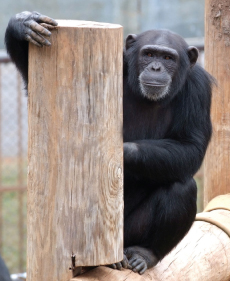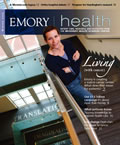Dining at the animal house

Animals play a critical role in scientific progress and life-saving medical developments.
The fall dinner party that Stuart Zola hosted wasn't just any Friday night get-together. The event brought Zola together with 16 strangers, so to speak. The 16 were Emory students who had signed up to dine with the director of the Yerkes National Primate Research Center. And helping Zola host were six Yerkes employees, including a vet, researchers, and staff members, three of whom were Emory graduates themselves.
The occasion gave Zola a chance to talk about a favorite topic—the critical role animals play in scientific progress and lifesaving medical developments. At Yerkes, one of only eight research centers designated by the NIH as a national primate research resource, animal research has led, for example, to a promising AIDS vaccine and discoveries about age-related neurodegenerative diseases such as Alzheimer's.
One of Zola's priorities is to tell the stories of Yerkes, and there are many. Scientists at Yerkes are exploring new imaging technologies to tailor medications to treat cocaine addiction. They are examining the role of cells in controlling immune responses, with applications for preventing organ rejection after transplant. And researchers are working on treatments and a vaccine to treat Alzheimer's.
Yerkes also shares its stories through a program that takes researchers into the community and brings students and others to the center for hands-on experiences. Last year, along with hosting these groups, Yerkes opened its doors to nine Emory freshmen mentoring groups, and during fall and spring finals weeks, sponsored study breaks, providing another opportunity for Emory students to interact with staff.
Public education is a slow process, demanding patience, hard work, and a commitment to truth, but Zola believes it is vital that the community understand what Yerkes is about and the good it is doing for health. "Researchers have a new part to their job description: to educate, explain, and counter the misinformation that can be damaging to our work," he says.
|
|



